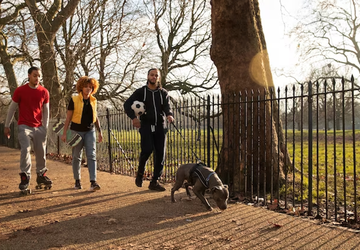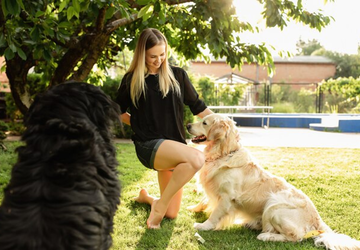When it comes to training your beloved canine, selecting one of the top dog training schools is crucial. The USA boasts numerous reputable dog training centers, but finding the right one requires careful consideration. This guide aims to help you navigate the options and identify the best dog obedience schools to meet your and your dog's needs.
Key Factors in Selecting Dog Training Centres
- Accreditations and Qualifications: The credentials of the training school are paramount. Look for dog training centers that have certified trainers with recognized accreditations. This ensures that the training methods are up-to-date and effective.
- Training Philosophy and Methods: Each school has its own approach, so it's important to choose a school whose philosophy aligns with your views. The best dog obedience schools often use positive reinforcement techniques, which are proven to be effective and humane.
- Specializations and Services Offered: Depending on your needs, you might look for schools that specialize in certain areas. Some top dog training schools offer specific training programs like agility training, service dog training, or behavioral modification.
- Class Size and Individual Attention: The class size can impact the quality of training. Smaller classes or individual sessions ensure personalized attention, which can be crucial for addressing specific behavioral issues.
- Facilities and Location: The quality of the training facilities and the location of the dog training centers also play a role. Ideally, the site should be convenient, and the facilities should be safe and well-equipped.
Evaluating Reviews and Success Stories

Researching and reading reviews from other dog owners can provide valuable insights into the effectiveness of a training school. The best dog obedience schools will have numerous positive testimonials and success stories.
Cost Considerations
While cost should not be the only factor, it is an important consideration. The top dog training schools may charge more, but often, the quality of training justifies the expense. It’s important to find a balance between the cost and the value of the training provided.
Trial Classes and Visits
Visit the school or attend a trial class. This allows you to observe the training in action, assess how trainers interact with dogs, and determine whether the environment is a good fit for your pet.
Importance of Continued Support
Post-training support is an often overlooked aspect of dog training. The best dog obedience schools offer continued support and advice, ensuring that you can maintain and reinforce the training at home.
Understanding the Trainer’s Expertise and Background
When evaluating top dog training schools, it’s essential to consider the trainers' expertise and background. Experienced trainers often have a diverse skill set, from basic obedience to solving complex behavioral issues. Inquiring about the trainers' education, certifications, and years of experience can provide a better understanding of their expertise. Schools that emphasize ongoing education.
Customized Training Programs
The mark of excellent dog training centers is their ability to offer customized training programs. Dogs, like humans, are individuals with unique personalities and learning styles. A school that tailors its programs to suit individual dogs' needs is often more effective. This personalized approach is particularly important for dogs with specific behavioral challenges and is a characteristic feature of the best dog obedience schools.
Incorporating Socialization in Training
Socialization is a critical component of dog training, especially for puppies. Top dog training schools often incorporate socialization into their programs, helping dogs learn how to interact appropriately with other dogs and people. This aspect of training is crucial for developing well-adjusted, confident dogs and is a key consideration in any dog training center.
Assessing the School’s Success Rate and Reputation
The success rate and overall reputation of the school are important indicators of quality. Top dog training schools will have a track record of successfully trained dogs and satisfied owners. Checking for awards, recognitions, and affiliations with reputable organizations can also provide insights into the school's standing in the dog training center community.
The Role of Environment and Equipment

The training environment and equipment used by the school can significantly impact the quality of training. Best dog obedience schools invest in safe, clean, and well-maintained facilities equipped with the necessary tools to aid in training. The environment should be conducive to learning, free from distractions, and safe for both dogs and their owners.
Support and Resources for Dog Owners
Beyond the training sessions, the best dog obedience schools offer additional support and resources for dog owners. This can include access to educational materials, workshops, and online resources that help owners reinforce training at home. Schools that provide comprehensive support demonstrate a commitment to the long-term success of their canine students.
Conclusion
Selecting the right dog training school is a significant decision that can profoundly impact your dog's behavior and your relationship with your pet. By considering factors like qualifications, training methods, class size, facilities, and support, you can find a school that not only ranks among the top dog training schools in the USA but also caters specifically to your dog's needs. Remember, the goal is to create a positive and lasting behavioral change in your dog, enhancing the bond between you and your pet.
FAQ’s
FAQ 1: What Qualifications Should I Look for in a Dog Trainer?
Answer: Look for dog trainers with recognized certifications from reputable organizations like the Certification Council for Professional Dog Trainers (CCPDT) or the International Association of Canine Professionals (IACP). Experienced trainers with a background in animal behavior are preferable.
FAQ 2: How Important Is Customized Training in Dog Training Schools?
Answer: Customized training is crucial as it ensures the training program meets the specific needs of your dog. Schools that offer tailored training approaches can address individual behavioral issues more effectively, benefiting both the dog and the owner.
FAQ 3: Can Socialization Be a Part of Dog Training Programs?
Answer: Yes, socialization is often a part of dog training programs, especially for puppies. It involves exposing the dog to various environments, people, and other animals to promote well-adjusted behavior and reduce fear or aggression.















